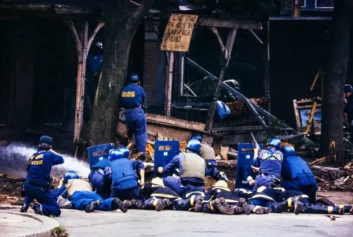After months of brutal violence last year surrounding worker strikes at South African mines, labor conflict was back in the news Wednesday as nine striking workers were arrested and seven had to be hospitalized after police fired rubber bullets at them.
About 250 employees engaged in a wildcat protest at Shanduka Coal’s Graspan colliery, refusing to disperse after handing a notice to management detailing their demands.
Brig.Selvy Mohlala, police spokesman for Mpumalanga province, said striking workers charged the police lines with heavy earth-moving equipment, prompting the police to fire the rubber bullets.
“The police dispersed the striking employees, who were on mine premises illegally, had seized mine equipment, and were refusing to leave peacefully,” Shanduka Coal, partly owned by global commodity trader Glencore, said in a statement. “The industrial action was unlawful, unprotected and in breach of the employees’ contracts of employment.”
There were illegal walkouts over bonus payments during the past two weeks at five collieries owned by diversified mining company Exxaro.
The conflicts at the mines erupted last August when police opened fire on a group of striking workers at the Lonmin mines in Marikana, killing 34 in a massacre that shocked the world. In October, a judicial inquiry heard that 14 of the 34 murdered workers were shot in the back — debunking claims by the police that the miners were all charging them.
The unrest rocked the nation’s economy and caused a serious decline in the value of the rand, South Africa’s currency. South Africa is the world’s biggest platinum producer and the fifth-largest gold producer.
Miners typically earn the equivalent of $500 a month.
The strike has affected eight gold, platinum and chrome mines and has cost the industry 4.5 billion rand ($548 million) in lost output, according to South African President Jacob Zuma.
Since November, farm workers in the $1.3 billion fruit and wine industry have also been demanding pay increases and clashing with authorities, resulting in three deaths at the hands of police.
But unlike the mine workers, the farm workers are not unionized, meaning they have to negotiate individually with employers. They also are more vulnerable because most of them live on the farms and face eviction if they make demands on the farmers.
The government-mandated minimum wage is about $8 a day (69 rand). The farm workers are demanding that it be doubled to 150 rand a day. The workers are also seeking better living conditions, describing their dwellings on some farms as rat-infested hovels, without toilets, running water or electricity.
In addition, a 2011 report by Human Rights Watch chronicled the workers’ exposure to toxic pesticides, lack of access to drinking water or sanitation, and failure to pay sick leave. At one time, the farmers used a system of payment in alcohol. While that has largely been abolished, the Western Cape still has the world’s highest rates of fetal alcohol syndrome.
To make matters worse, there is also an element of race in the conflict — almost all of the farmers are white and the workers are black.


